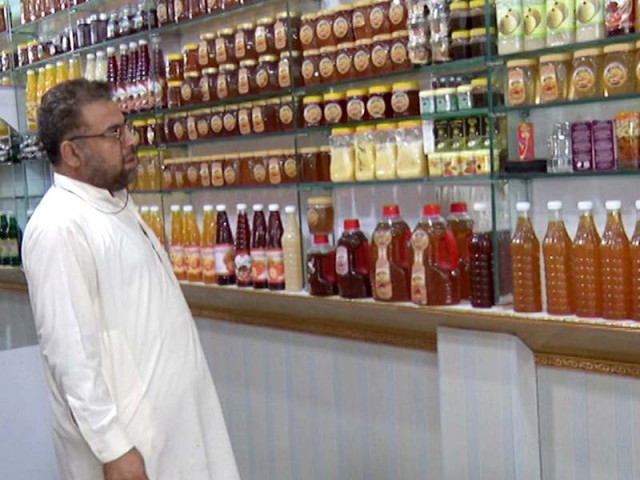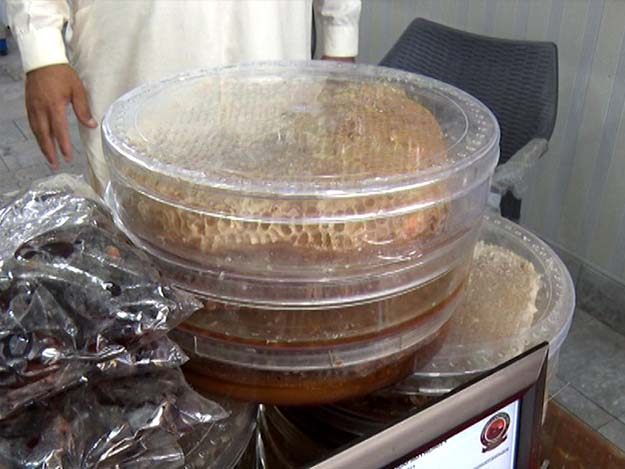K-P’s liquid gold traders seek access to markets in developed countries
Urge govt to help unlock lucrative European and American markets

A customer looks at a large variety of honey bottles at a shop that also sells whole beehives in Peshawar . PHOTOS: EXPRESS
But as they observed the World Bee Day, traders have urged the government to do more to help them enter the lucrative markets in the developed economies of the world.
Comprising a whopping 1,200 shops, store owners in the sole honey market of the province, Pakistan International Honey Market (PIHM), decry the absence of basic facilities, lack of government’s patronage and the absence of any concerted effort to search for and develop new honey markets in the world.
PIHM and Beekeeper’s Association President Naeem Qaseemi told The Express Tribune in a forum that the beekeeping business in the province was currently limited to some private farms.
“Even though the government is cognizant of the fact that the business makes millions of dollars in foreign exchange from exports, it is still deprived of giving it an industrial status,” Qaseemi said.
He recalled that in the 1980s, the Australian government had provided bees to the Tarnab Farms in Peshawar which helped set the basis of the beekeeping and honey business in the peripheries of the provincial capital.
But four decades on, he said that there has been little change in either how the business works, nor were modern techniques introduced to enhance production or process the honey. Moreover, there is still little to no government patronage for the industry.

“The honey business in the Tarnab market has been booming day after day despite the fact that the government offers little by way of facilitation,’ the PIHM president said, adding that the market has swelled to 1,200 shops most of which are busy in exporting honey to the Gulf countries, earning millions of dollars.
Qaseemi said that the business has spread to other parts of the province as well including to Swat, Karak, Kohat, Frontier Region Peshawar districts, and Nowshera’s Manki area. It has even caught on in the Attock and Chakwal districts of Punjab.
“Our only demand from the K-P and the federal government is to speak to the United States and European Union and sign treaties for exporting honey to these markets,” he said, adding that this will help create new job opportunities for the unemployed youth of the province apart from earning crucial foreign exchange.
Qaseemi, who claimed to have laid the foundation of the beekeeping association back in 1996 along with a few other like-minded souls, said that like other businesses in the province, their business too had suffered from the militancy and subsequent operations to clear the militants.
The war against terrorism and the military operation in the tribal districts — a source for beekeepers — has affected the business the most, he said, adding that the war in Afghanistan had also affected the honey trade between Kabul and Peshawar.
“We are working on a self-help basis for expanding the business, but still we need a modern laboratory for testing our honey and to matched it with the standards of the international market,” he said, adding that a number of multinational companies earn millions after buying Pakistani honey in the raw form.
“We are still struggling due to lack of [government] patronage,” Qaseemi concluded.
Published in The Express Tribune, May 21st, 2019.













COMMENTS
Comments are moderated and generally will be posted if they are on-topic and not abusive.
For more information, please see our Comments FAQ